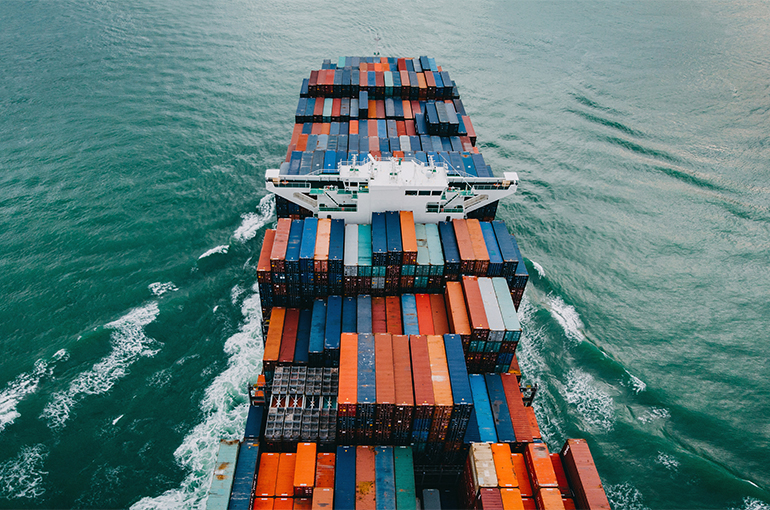 Smaller Exporters in China’s Zhejiang React to US Tariffs With Confidence and Caution
Smaller Exporters in China’s Zhejiang React to US Tariffs With Confidence and Caution(Yicai) April 23 -- Small and medium-sized enterprises in Zhejiang province, a major hub for China’s export-oriented companies, told Yicai that steep US tariff hikes are taking a toll. But despite the pressure, some business owners remain confident about continuing exports to the American market.
“High tariffs can’t completely cut off Chinese exports to the United States because there are simply no substitutes from other countries for many of the products,” said Wang Xin, chief executive of Spelor Electrical Appliances Zhejiang, whose exports to the US are now subject to a 170 percent border tax.
Spelor mainly produces and exports small kitchen appliances, such as ice machines, ice cream makers, and beverage machines. About 70 percent of the Linhai-based company’s revenue comes from overseas sales, of which 60 percent is from the US and 25 percent from Europe.
A 170 percent tariff rate may reduce the competitive advantage of Spelor's products but it will not completely halt the company's exports of ice and ice cream machines to the US in the long term, Wang said.
“Once the tariffs are implemented, prices for Chinese-made goods in the US will rise, which will definitely dampen consumer demand and reduce market appetite,” Wang pointed out. But “China’s industrial chain is robust, our workers are diligent, wages are reasonable, and we also have an edge in new product development.
“The competitiveness of Chinese firms won't disappear just because the US raises tariffs,” Wang noted.
The owner of a wooden toy manufacturer that company mainly supplies US toy brand Melissa & Doug expressed less confidence in the outcome of the trade war.
“Our profit margin was already razor-thin,” he said. “Reaching seven percent was considered pretty good, so even a 5 percent tariff increase could be enough to push us out of business.”
After US President Donald Trump imposed the first additional 10 percent tariff on Chinese imports, the company negotiated with its US clients to share some additional costs. But as the tariffs continued to rise, “we more or less stopped discussing cost-sharing altogether,” the owner said.
He said his factory is still working to fulfil his US client’s next order, scheduled for delivery in the third quarter, holding onto the slim hope that the trade dispute could be settled by then.
The owner added that he is not overly concerned about the possibility of his client refusing to take the goods and make payment if the high tariff rate is still in place because it is not in their interest to drop Chinese suppliers and never come back.
Alternative Markets
In March, Wang visited four European cities -- Budapest, Milan, Paris, and Warsaw -- to make deals with local agents. He also participated in a trade fair in the Polish capital.
He noted that each country has different laws and policies, so “doing business in Europe is more challenging.” Nevertheless, he hopes that Spelor’s sales in that market can reach half that of the US market.
Even though the US will remain Spelor's main market, the company's factories in China will mainly serve its European clients, while its overseas plants will ship to the United States, Wang said.
In contrast, the toy firm’s owner said he lacks the confidence to expand into the European market as the company does not have any local partners in the region. The company used to sell 80 percent of its exported products to the US and the rest mainly to Canada.
He is also hesitant about investing in new factories in Southeast Asia, citing concerns over the unpredictability of US tariffs and the relatively underdeveloped supply chains in the region.
“Expanding overseas now could lead to failure more quickly," he noted. "If the US imposes tariffs on these countries, it won't matter if we relocate our factories.”
Policy Hopes
Wang hopes the Chinese government can provide SMEs unfamiliar with regulatory environments overseas by providing various resources.
“For example, it could set up a dedicated organization with offices in countries where many Chinese businesses operate to offer services such as talent development and training on local laws and regulations,” Wang suggested. “This would help them address the challenges related to labor, funding, and cultural differences when investing in overseas factories.”
The toy business owner hopes China’s government will provide trade-in subsidies on toys similar to those for automobiles and home appliances, as that could help toy exporters expand in the domestic market.
He also called for more financial support for SMEs and temporary relief from paying social security contributions for employees, “so that companies can survive this transition period.”
Editors: Tang Shihua, Futura Costaglione